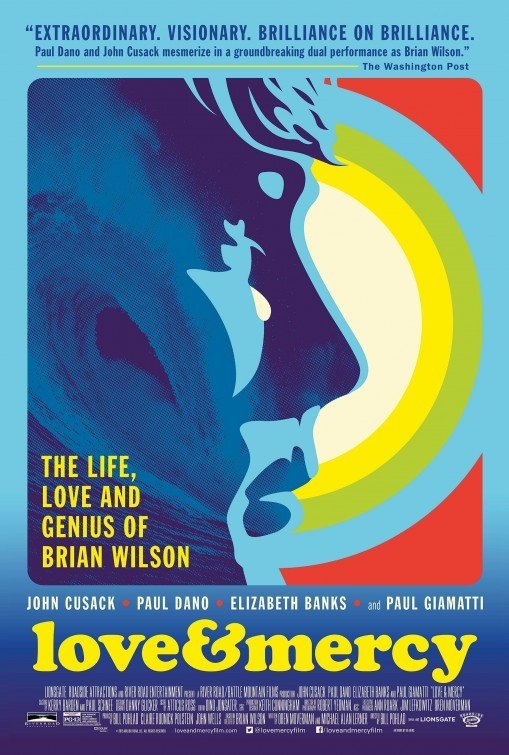“A Hopeful Musical Trip”

| None | Light | Moderate | Heavy | |
|---|---|---|---|---|
| Language | ||||
| Violence | ||||
| Sex | ||||
| Nudity |
What You Need To Know:
LOVE & MERCY is likely to appeal to Beach Boys fans or rock music fans in general. The plot focuses on Brian and only vaguely addresses the larger story of the Beach Boys. One of its strengths lies in showing how “Pet Sounds” was created, dispelling some of the mystery behind the famous album. There is a good versus evil element to LOVE & MERCY. Brian is in a continuous battle for his creativity and sanity against the evil control of his father and his psychiatrist. Despite an upbeat ending and some positive values, LOVE & MERCY warrants extreme caution for some immoral behavior, foul language and drug references.
Content:
(C, B, PaPa, O, LL, V, S, N, A, DD, MM) Light redemptive, moral worldview as love and mercy seems to help a man overcome mental instability and where people fight for the moral and ethical treatment of a man being abused and exploited, but there are scenes where people often act selfishly for their own personal gain and a moment when a man tells wife he saw God during a drug trip, and God showed him the future; total of 21 obscenities and profanities, slang term used for breasts, man calls an undeserving woman demeaning feminine names; father hits son in the face, man talks about father abusing him as a child; implied fornication with unmarried couple shown in bed together; natural upper male nudity mostly with swimsuits on, woman’s nude back is briefly exposed; several scenes with drinking alcoholic beverages but no one is shown drunk; a man gets high on LSD twice and tells his family and friends about it, entire band sits in a smoky room apparently smoking illegal drugs, many scenes with cigarette smoking; and, man abuses his privilege of being a psychiatrist to over medicate a patient in order to control him, psychiatrist verbally abuses patient, man exploits a mentally ill person for his own financial gain, parents of three boys split up and live separately, man yells at and verbally abuses a woman, and father constantly criticizes son and undermines his accomplishments.
More Detail:
The movie begins in the 1980s, nearly two decades after the height of the Beach Boys’ fame. Brian meets Melinda Ledbetter while shopping for a new car. She notices the strange behavior of the men accompanying him and also his obvious attraction toward her. It doesn’t take long for Brian to ask Melinda on a date, and soon the two start to see each other regularly.
After it’s been established that Brian’s personality has reverted to a more childlike state and that he’s lost some modicum of control over his life, the movie cuts back to the 1960s when the Beach Boys are preparing for a tour in Japan. A montage of their musical and pop culture success is followed by a series of scenes showing the material rewards their gold records have produced.
At an extravagant party at their mansion in Los Angeles, the boys discuss the upcoming tour in Japan, but Brian is clearly disturbed at the prospect of leaving home. He begs his brothers to let him skip the tour and stay behind to work on songs for their next album. Brian insists he’s got loads of new ideas that have never been done before. They reluctantly agree as the first hints of Brian’s mental illness emerge.
The movie progresses by cutting back and forth between the 60s and the 80s. As Melinda is introduced to Brian’s legal guardian and manager, Dr. Landy, she begins to recognize the abusive relationship the two men share. She tries to encourage Brian to regain control over his personal and creative life. This sparks a contentious a battle between Dr. Landy and Melinda, and she becomes Brian’s only hope of restoring him to normalcy.
Jumping back to the 60s, Brian is in the throes of creating the album “Pet Sounds” while fending off the criticisms of his father and fellow band members. The pressure for continual success mounts, along with the disturbing sounds inside his head, which eventually lead to a complete mental meltdown that disrupts his career and family life.
LOVE & MERCY is the sort of movie that is likely to only appeal to Beach Boys fans or rock music fans in general. While the band is known the world over, the name Brian Wilson is less recognizable than many of his colleagues from the same era. The plot focuses almost exclusively on him, and only vaguely addresses the larger story of the Beach Boys. One of its strengths is in showing the tedious detail of recording “Pet Sounds,” which dispels some of the mystery of the creative process behind the famous album. These are the most enjoyable parts, but the fun is quickly snuffed out by all the discord that weaves through both the past and present of Brian’s life. The viewers are pulled in two directions: sympathy for Brian; and, sympathy for those affected by his abnormal behavior. Brian’s genius and innocence are touted as victims of abuse from his father, which is mirrored by that of Dr. Landy in Brian’s later years.
Toward the end, Brian goes through a trippy montage that’s implied as his final schizophrenic bout where he has flashbacks of his childhood. In this sequence, the significant figures in his life appear at his bedside communicating the other plot points of the movie through dialogue instead of them being shown. This little sequence is a bit confusing as it jumps back and forth quickly through time, trying to connect all of the dots, but it feels disconnected from the rest of the movie.
There is a good versus evil element to LOVE & MERCY where the good guy, Brian, is in a continuous battle for his creativity and sanity against the evil ways of his father and Dr. Landy. Unable to save himself, he must rely on the love and mercy of Melinda for protection. Only she is able to rescue him from his depressed and childlike state. Hope is brought back into a hopeless life. In this way, the relationship between God and humans is emulated, especially since it would have been extremely easy for Melinda to walk away in the face of a strange and dangerous situation.
That said, there are some ungodly moments in LOVE & MERCY as well. Brian and Melinda initiate a physical relationship outside of marriage. Dr. Landy hunts Melinda down at her office and goes on a demeaning and offensive tirade stemming from his anger at her defending Brian against his own exploitive practices. There are a handful of scenes were physical and verbal abuse are portrayed or referenced. Some profanities and obscenities are used, as well as slang terms for female body parts. Broken family relationships and friendships are seen, as well as some drug use and foul language.
All in all, therefore, despite the upbeat ending and some positive values, LOVE & MERCY warrants extreme caution.


 - Content:
- Content: 




